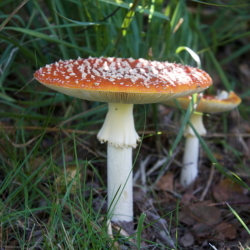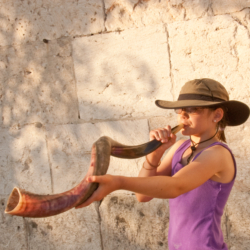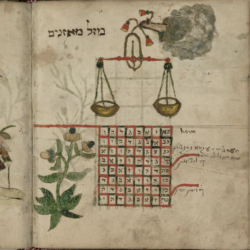| Source (Yiddish) | Translation (English) |
|---|---|
דאש זאגט מען װען מען איז מזכיר נשמות׃ |
The following is recited at yizkor:[1] Passages taken from the yom tov yizkor liturgy |
יזכור גאט זאל גידײנקען דיא נשמה פון מײן פאטער ער הײסט מיט זײן נאמן (פלוני בר פלוני) דער װאס איז גיגאנגען אויף יענער װעלט זאלסטו אים הײנט גדײנקן אום װילן דאס איך בין מנדר פון זײנט װעגין אום דעם װילן זאל זײן נשמה רוען אין גן עדן מיט דיא נשמות פון (אברהם יצחק ויעקב שרה רבקה רחל ולאה) אונ אנדערע צדיקים אונ צדקניות דיא װאס זײנן אין (גן עדן) אונ מיר װעלין זאגן (אמן)׃ |
May God remember the soul of my father, (Ploni ben Ploni), who has gone on to the other world. Remember him today, and for that purpose I donate to tsedaqah[2] Tsedaqah (along with teshuvah and tefilah) to avert harsh decrees. Cf. Bereishit Rabbah 44:15 for his sake, so that his soul may rest in Gan Eydn with the souls of Avraham, Yitsḥaq, Yaaqov, Sarah, Raḥel, and Leah and with the souls of the other righteous men and women who are in Gan Eydn, and let us say amen. |
יזכור גאט זאל גדײנקן דיא נשמה פון מײן מוטר זיא הײסט מיט איר נאמן (פב״פ) װאס זיא איז גיגאנגן אויף יענער װעלט זאלסטו זיא הײנט גידײנקו אום װילן דאס איך בין (מנדר צדקה) פון אירט װעגן אום װילן דאס לוין זאל איר נשמה רוען אין גן עדן מיט דיא נשמות פון (אברהם יצחק ויעקב שרה רבקה רחל ולאה) אונ מיט אנדערי צדיקים וצדקניות װאס זײנען אין (גן עדן) אונ מיר װעלן זאגן (אמן)׃ |
May God remember the soul of my mother, (plones bas plones), who has gone on to the other world. Remember her today, and for that purpose I donate to tsedoke for her sake, that her soul may rest in gan eydn with the souls of Avraham, Yitsḥaq, Yaaqov, Sarah, Rivqah, Raḥel, and Leah and with the souls of the other righteous men and women who are in Gan Eydn and let us say amen. |
יזכור גאט זאל גדײנקען דיא נשמות פון מײן פאטר אונ מוטר אונ מיץ עלטער פאטר אונ עלטר מוטר אונ פעטערס אונ מומעס אונ שװער אונ שװיגער ברידער אונ שװעסטער װאס זײא זײנן גיגאנגן אויף יענער װעלט זאלסטו הײנט גידײנקן אום װילן דאס איך בין (מנדר צדקה) פון זײערט װעגין אום דעם לוין זאלן זײערע (נשמות) רוען אין (גן עדן) מיט דיא נשמות פון (אברהם יצחק ויעקב שרה רבקה רחל ולאה) אונ מיט אנדערע (צדיקיס וצדקניות) דיא װאס זײנען אין (גן עדן) אונ מיר װעלין זאגין (אמן)׃ |
May God remember the souls of my father and mother, my grandfathers and grandmothers, my uncles and aunts, my father-in-law and my mother-in-law, my brothers and sisters, who have gone on to the other world. Remember them today, and for that purpose I donate to tsedoke for their sake so that their souls may rest in Gan Eydn with the souls of Avraham, Yitsḥaq, Yaaqov, Sarah, Raḥel, and Leah and with the souls of the other righteous men and women who are in Gan Eydn, and let us say amen. |
יזכור גאט זאל גידײנקען דיא נשמה װאס הײסט (פב״פ) אונ די נשמות פון אלע מײנע פרײנד פון מײן פאטערס (צד) אונ פון מײן מוטרס (צד). סײא דיא װאס זײנן גישטארבין אויף איר בעט אונ סײא װאס האבין זיך גילאזט אין װאשער װארפין פון דײנט װעגן אונ דיא װאס האבין זיך גילאזט װערגין פון דײן הײליגן נאמן װעגן זאלסטו הײנט גידײנקען אום װילין מײן צדקה זײערע נשמות צו גדײנקן. אום דעם לוין זאל רוען זײערע נשמות אין (גן עדן) מיט די נשמות פון (אברהם יצחק ויעקב שרה רבקה רחל ולאה) אונ אנדערע צדיקים וצדקניות (אמן)׃ |
May God remember the soul of (Ploni ben Ploni) and the souls of all of my friends and relatives from my father’s side and from my mother’s side, those who have died as well as those who were martyred for your Holy Name’s sake, by drowning or by strangulation. Remember them today, and may my donations to tsedoke memorialize their names. For this deed, may their souls rest in Gan Eydn with the souls of Avraham, Yitsḥaq, Yaaqov, Sarah, Rivqah, Raḥel, and Leah and with the souls of the other righteous men and women who are in Gan Eydn and let us say amen. |
אום ימים טובים זאגט מען דאס׃ |
On holidays, this is said: |
מי שברך (אבותינו) װער עש האט גיבענטשט אונזערע עלטערין (אברהם יצחק ויעקב) דער זאל בענטשן (רבי פב״פ) פון װעגין דאס ער האט מנדר גיווען אין דער צדקה אום װילין דיא רײנע נשמות װאס מיר האבין הײנט מזכיר גיווען פאר הקב״ה פון װעגין זײן הײליגע תורה. אונ פון װעגין דעם הײליגן טאג דער דא הײנט איז. דעסט װעגין זאל זײן דער לוין אז הקב״ה זאל אים היטן אונ בשירמען פון אלע קראנקײט אונ זאל שיקין בענטשונג אונ זאל באגליקן אלע זײנע װערקין אים אונ אלע ישראל אלע זײנע ברידער אונ מיר װעלין זאגין אמן׃ |
May the One who blessed our ancestors[3] From the mi sheberakh given for the honor of an aliyah at a Torah reading. Avraham, Yitsḥaq, and Yaaqov, bless (Ploni ben Ploni), who has vowed to give tsedoke to memorialize the pure souls of those we have caused to be remembered today. For the sake of the blessed Holy One and for the sake of their holy Torah and for the sake of the holiness of this day, may the blessed Holy One guard and protect him from sickness and bestow blessings upon him and grant him success in all of his endeavors, upon him and upon all Yisro’el, for all are brothers, and let us say amen. |
אום יום כפור זאגט מען דאס׃ |
On Yom Kippur, this is said: |
מי שברך (אבותינו) װער עס האט גיבענטשט אונזרע עלטערן (אברהם יצחק ויעקב) דער זאל בענטשן (ר׳ פב״פ) אום װילן דאס ער האט מנדר גיווען אין צדקה װעגן דיא רײנע נשמות װאס מיר האבין הײנט מזכיר גיװען פאר הקב״ה אונ פון זײן הײליגע תורה װעגן אונ פון װעגן דעם הײליגן טאג דער הײנט איז דעסט װעגן זאל אים הקב״ה היטן אונ באשירמן פון אלע לײד אונ לײדיגר פון אלע קראנקײט אין דער װעלט אונ זאלסט אים אן שרײבין אונ אן חתמנן צו לעבן אונ צו אלע גוטץ אין דעם יום הדין װאס הײנט איז אונ זאלסט שיקן אײן בענטשונג אונ זאל אים בגליקו איו אלע זײנע װערק. ער אונ כל ישראל אלע זײנע ברידר אונ מיר װעלן זאגן אמן. |
May the One who blessed our ancestors Avraham, Yitsḥaq, and Yaaqov, bless (Ploni ben Ploni), who has vowed to give tsedaqah for the sake of the pure souls of those we have caused to be remembered today before the blessed Holy One and for the sake of their holy Torah and for the sake of the holiness of this day. Therefore may the blessed Holy One protect him and guard him from all pain and from those who would cause him suffer and from all illness. Inscribe (Ploni ben Ploni) in the Book of Life and grant him a good life on this Day of Judgment. Bestow blessings upon him and success in all his endeavors, and upon all Yisro’el, for all are brothers, and let us say amen. |
אב הרחמים פאטער דער בארמיגר דער װאס רועט אין הויכן הימל מיט זײן שטארקע דער בארמיקײט זאל ער גדײנקן דיא חסידים אונ גאנץ פרומע אונ דיא רעכט פארטיגע אונ דיא הײליגע קהלות דיא װאס האבין איבר גיענטפרט זײערע לײבער אויף (קידוש השם) די גליבטע אונ דיא ליבליכע בײא זײער לעבן אונ צו דעם טויט האבין זײא זיך דער געבן. מער אז דיא אדלער זײנען זײא גיווען גרינג אונ מער אז װיא דיא לײבן האבין זײא זיך גישטארקט צו טאן דעם װילן פון זײער בשעפר אונ דעם בגער פון אירין באשעפער. ער זאל זײא גידײנקן גאט צו גוטן מיט דיא אנדרע צדיקים פון דער װעלט אזו װיא גישריבין שטײט אין תורת משה דער געטליכער מאן לויבט איר פעלקער זײן פאלק אונ דורך דײנע קנעכט דיא (נביאים) איז גשריבין גאט רועט אין ציון׃ |
Compassionate Father[4] A paraphrase of the prayer, Av Harokhomim who resides in the heavens above, may you in your great mercy, remember the good and pious and righteous people and the holy congregations who were martyred for the sanctification of the Name. They were lovely and beloved in their lifetimes and they went to their deaths together. They were swifter than eagles and mightier than lions[5] 2 Samuel 1:23 in their attempts to do with lovingkindness the will of their Creator and to please Hashem. May God remember them for good, together with all other righteous people of the world, as it is written in the Torah of Mosheh, the man of God: “Nations, praise ye his nation.”[6] Deuteronomy 32:43 And through Your servants, the prophets, for it is written: “God rests in Tsiyon.”[7] Joel 4:21 |
דיא תחנה זאל מען זאגין נאך הזכרת נשמות׃ |
This tkhine should be recited after the yizkor service: |
יהי רצון עש זאל זײן דער װילן פאר דיר גאט מײן גאט אונ גאט פון מײנע עלטרן אז דו זאלסט טאן הײנט מיט דײן גרויס גינאד אויף דיא הײליגע נשמות דיא דא זיפצין מיט לויב אונ בעטן אויף דײן הײליגע פאלק אז צװישין זײא זאלסטו לײכטן אויף דיא נשמות פון אלע מײנע פרײנד (הן מצד אבי הן מצד אמי) אונ אלע נשמות װאס שטײען אין דרײא שורות אין (גן עדן) אונ אלע טוען לויבן גאט אונ אונזר קיניג אונ בעטן לעבן אונ פריד. איך בעט דיך מיט גרויס קראפט דײן דר בארמיקײט. |
May it be your will, God, my God, and God of my ancestors, thatyou may act graciously towards the holy souls who sigh and praise you and pray for your holy people. Include among them the souls of my relatives, both from my father’s side and from my mother’s side, and all the souls that stand in the three rows in Gan Eydn and all those who praise God, our King, and pray for life and happiness. With all my strength, I pray to you for your mercy. |
דײנע אויערן זאלן פאר נעמן מײן גיבעט פאר נעם מיט דער בארמיקײט. דוא זאלסט מבלבל זײן פון דײן פאלק אלע גרים צארן אונ אלע משחיתים אונ זאלסט געבן חײם ושלום ופרנסה טובה עושר וכבוד ואריכת ימים ושנים מיר אונ מײן מאן אונ מײנע קינדר. אונ זאלסט אונז געבין אײן גוט הארץ אז מיר זאלן דיר דינען מיט גרויש נחת. אונ זאל דײן גינאד גרײכן אויף אלע הײליגע נשמות אונ אויף דיא נשמה פון מײן פאטר אונ מוטר אז זײ זאלן אויף גײן אונ קומן אונ זאל װערן גדאכט פר דײן הײליגין דר בארמיגן שטול אונ דארטן זאל זײן זײער רואונג אונ דו זאלסט אײן בינדן זײערע נשמות אונ דיא נשמות פון מײן פאטר אונ מוטער (לפני ולפנים) אויף דעם היכל װאס קײן אויג קען ניט פר שטײן נײערט דוא אלײן אונ דו זאלסט מאכן שײנן אויף זײערע נשמות דאס לויטרקײט אונ דו זאלסט זײא זעטין מיט פעטקײט דײן הויז אונ פון דעם באך פון (גן עדן) זאלסטו אן טרינקן. |
May your ears accept my plea with mercy. May you turn away in confusion all wrath and destruction directed at your people and may you grant life and peace and good livelihood – indeed, wealth and honor and length of days and years to me, my husband, and my children. May you give us a good heart that we may serve you with complete fulfillment. And may your grace reach all the holy souls and the souls of my father and mother so that they may arise and come before your holy merciful throne, and may their resting place be there. May you bind up the souls of my father and mother – and all holy souls – in the innermost sanctuary of the palace which no eye can comprehend, except for yours. May you make purity shine upon their souls, and may you satisfy them with the bounty of your house, and may you let them drink from the river of Gan Eydn.[8] See 1 Enoch (Ethiopic, Slavonic) and Pereq Gan Eden: Under the Tree of Life flow four rivers, one of milk, the other of balsam (alternately oil or water), the third of wine, and the fourth of honey. See Louis Ginzberg, Legends of the Jews vol. 1, “The Ten Generations” p.132 (with note in vol. 5, p. 159) and “The Creation of the World” p.20 (with note in vol. 5, p.29): “These four streams are frequently mentioned in the legends; comp. 2 Enoch 8:5; PR 38, 163a; Aggadat Shir 4, 83-84; see also vol. I, p. 132; vol. II, p. 315; Visio Pauli 23; Koran 47. 16-17. While in the Koran the stream of oil is replaced by a stream of fresh water, it is just this stream of balsam which is frequently alluded to in rabbinic literature; BR 62 (beginning); Ta’anit 25a; Yerushalmi ‘Abodah Zarah 3, 42c; Tan. B. II, 131; Bacher, Agada der palastinensischen Amoraer, II, 102, note 7; Jeremias, Babylonisches im NT, 47. On the wine preserved for the pious, comp, Sanhedrin 99a and Matthew 26:29; Targum Eccl. 9:7, where the Midrash given in the text was very likely made use of.” |
אונ אויך דיא נשמות פון מײנע קרובים בעט איך דיך ליבער גאט דער דא לײכט אויף דער ערד אונ דיא לײט װאש װאונן אויף דער ערד. דער לײכט דײן שכינה אונ זאלסט זאגן צוא דעם מלאך װאס איז (ממונה) איבער זײא צו דר גרינגערין פון זײא דעם משפט אינ זײא זאלין גפינן איטליכר זײן רואונג אונ זאלן זײן בשלום אונ זײא זאלן גײן פון אײן מדרגה צו דר אנדרע מדרגה אונטער דיא פליגל פון דיא כרובים אמן כן יהי רצון׃ |
I beseech you, dear God, shed your light upon the souls of relatives and upon all the people who live on the earth. May the Shekhinah[9] Cf. Ezekiel 43:2 shine forth, and may you tell the angel who is appointed over them to lighten their sentence, and may they find their resting place and be at peace, and may they rise continually from one level of heaven to another under the wings of the keruvim.[10] Cf. Isaiah 6:1-3 Amen, may it be your will. |
“Tkhine of the Matriarchs for Yizkor” by Rebbetsin Seril Rappaport is a faithful transcription of her tkhine included in “תחנה אמהות מן ראש חודש אלול” (Tkhine of the Matriarchs for the New Moon of Elul) published in Vilna, 1874, as re-published in The Merit of Our Mothers בזכות אמהות A Bilingual Anthology of Jewish Women’s Prayers, compiled by Rabbi Tracy Guren Klirs, Cincinnati: Hebrew Union College Press, 1992. shgiyot mi yavin, ministarot nakeni. The translation above is lightly adapted from that which appears there.
Source

Notes
| 1 | Passages taken from the yom tov yizkor liturgy |
|---|---|
| 2 | Tsedaqah (along with teshuvah and tefilah) to avert harsh decrees. Cf. Bereishit Rabbah 44:15 |
| 3 | From the mi sheberakh given for the honor of an aliyah at a Torah reading. |
| 4 | A paraphrase of the prayer, Av Harokhomim |
| 5 | 2 Samuel 1:23 |
| 6 | Deuteronomy 32:43 |
| 7 | Joel 4:21 |
| 8 | See 1 Enoch (Ethiopic, Slavonic) and Pereq Gan Eden: Under the Tree of Life flow four rivers, one of milk, the other of balsam (alternately oil or water), the third of wine, and the fourth of honey. See Louis Ginzberg, Legends of the Jews vol. 1, “The Ten Generations” p.132 (with note in vol. 5, p. 159) and “The Creation of the World” p.20 (with note in vol. 5, p.29): “These four streams are frequently mentioned in the legends; comp. 2 Enoch 8:5; PR 38, 163a; Aggadat Shir 4, 83-84; see also vol. I, p. 132; vol. II, p. 315; Visio Pauli 23; Koran 47. 16-17. While in the Koran the stream of oil is replaced by a stream of fresh water, it is just this stream of balsam which is frequently alluded to in rabbinic literature; BR 62 (beginning); Ta’anit 25a; Yerushalmi ‘Abodah Zarah 3, 42c; Tan. B. II, 131; Bacher, Agada der palastinensischen Amoraer, II, 102, note 7; Jeremias, Babylonisches im NT, 47. On the wine preserved for the pious, comp, Sanhedrin 99a and Matthew 26:29; Targum Eccl. 9:7, where the Midrash given in the text was very likely made use of.” |
| 9 | Cf. Ezekiel 43:2 |
| 10 | Cf. Isaiah 6:1-3 |

“תחנה אמהות | Prayer for Yizkor, from the Tkhine of the Matriarchs by Seril Rappaport (ca. 18th century)” is shared through the Open Siddur Project with a Creative Commons Public Domain Dedication 1.0 Universal license.










Leave a Reply